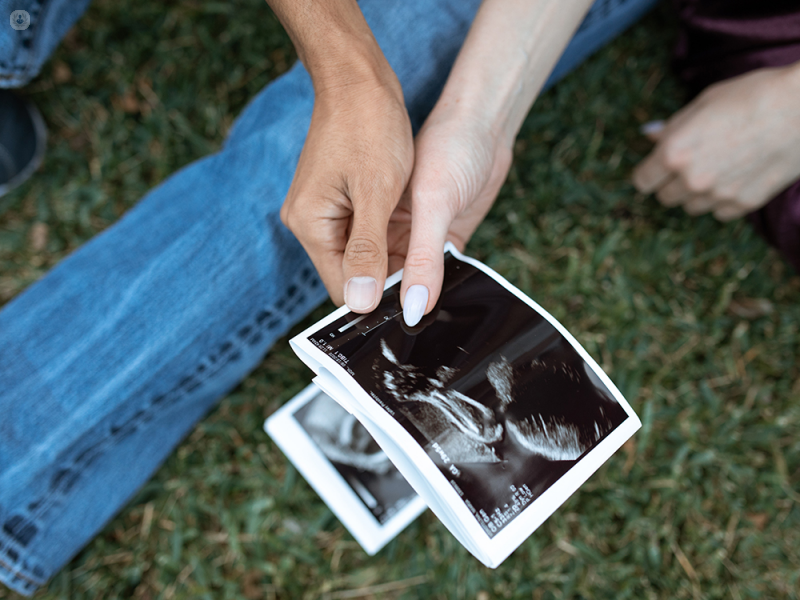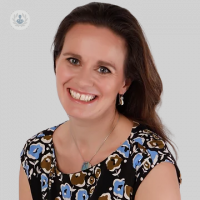Early pregnancy: what to expect during the first trimester of your pregnancy
Written by:The first trimester of your pregnancy starts on the first day of your last period and continues until the end of week 12. During this time, a lot of changes happen to your body and your baby grows from the size of a poppy seed to the size of a plum!
Here Dr Amelia Davison, one of our top consultant obstetrician and gynaecologists based in London, walks us through what to expect during these first three months of pregnancy, the types of tests you may need and the food and lifestyle changes you ought to follow to help get your pregnancy off to a healthy start.

When should you see a doctor in the first trimester of pregnancy?
The best time to see a doctor in early pregnancy would be around six weeks. An internal scan can be performed during this period to identify the baby’s heartbeat. The doctor can advise you on a healthy lifestyle for both you and your baby and talk you through the antenatal period.
Of course, if you develop pain or bleeding before this point then you should see an emergency doctor as early pregnancy complications can occur.
How does the baby grow in the first three months of pregnancy?
Your baby’s growth and development begins soon after conception. During the first trimester, the foetus develops all of its vital organs and it grows from the size of a poppy seed at four weeks to the size of a plum at 12 weeks!
The babies heart starts beating at around six weeks and by 12 weeks we can tell the sex of your baby. At this point, he or she will have all their vital organs, including fingernails!
What lifestyle changes can promote a healthy pregnancy?
It is important to really start looking after yourself and your developing baby as soon as you find out you are pregnant. In fact, you should even start while you are trying to get pregnant.
These important lifestyle adjustments will help promote a healthy pregnancy for both you and your baby:
- Take folic acid and vitamin D supplements to help your baby develop normally
- Avoid alcohol and smoking
- Limit your caffeine intake
- Continue to exercise
- Getting enough rest
- Maintaining a healthy lifestyle
What food should be avoided during the first trimester of pregnancy?
There are certain foods and drinks you should avoid during the first trimester as they can affect your babies development or increase your risk of getting certain infections.
These can include:
- All raw fish and certain other cooked fish like tuna, shark and swordfish
- Undercooked, raw and processed meat
- Meat rich in vitamin A like pâté
- Unpasteurised milk, cheese or fruit juices
- Raw or undercooked eggs
- All alcoholic drinks
In addition, all fruit and veg should be washed thoroughly and caffeine should be limited. Remember that there is also caffeine in some cold drinks, not just tea and coffee.
What tests might be performed during the first trimester?
Tests performed in the first trimester are usually ultrasound scans. It may be transvaginal which means a probe is passed into the vagina to check the baby is in the right place and developing normally.

At each antenatal visit, you will have your urine tested to look for signs of infection or protein. You will also have a blood pressure check at each visit.
As part of your antenatal care, you will also be offered blood tests to make your pregnancy safer.
In the first trimester, we check your blood group and rhesus status and we check your full blood count to look for anaemia. It is also important that we check to see if you are immune to or have had certain infections such as rubella, syphilis, hepatitis B and HIV.
It is a good time to start thinking about whether you would want to have any screening tests done on your baby, as these will be done early in the second trimester.
What are the signs of early pregnancy complications?
Early pregnancy complications sadly do happen. These can include:
- Miscarriage - the pregnancy does not develop normally which results in the subsequent loss of pregnancy
- Ectopic pregnancy - the pregnancy is developing outside of the womb in the wrong place, usually in one of the fallopian tubes
If you experience pain and/or bleeding you should be seen by a doctor as soon as possible.
Other complications that can occur in early pregnancy include urinary tract infections and hyperemesis. A urinary tract infection is where you experience stinging or burning on passing urine, and possibly a fever. Hyperemesis involves excessive vomiting during the early months of pregnancy. If you are at all worried you may be suffering from an early pregnancy complication, you must seek medical help as soon as possible.
Dr Amelia Davison is a highly-skilled consultant obstetrician and gynaecologist based in London. If you would like to make an appointment with her, head to her Top Doctors profile where you can book online.


